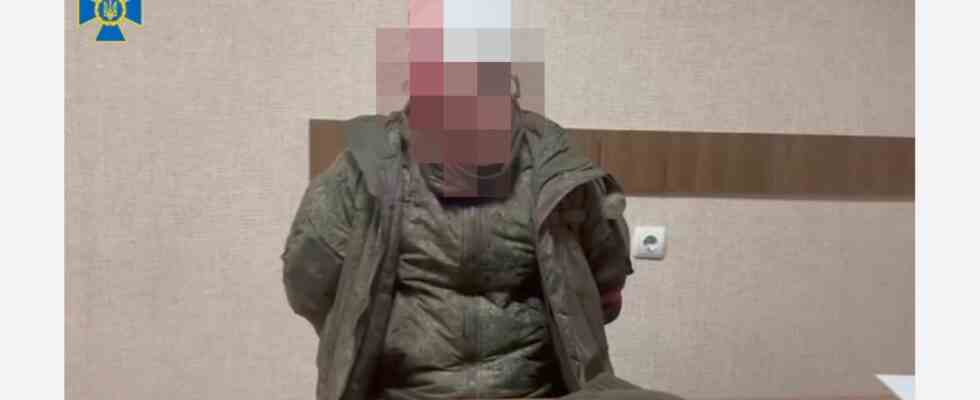fact finder
Status: 04.03.2022 2:00 p.m
Ukraine has released numerous videos of Russian soldiers being captured. Is this a violation of the Geneva Conventions?
Russia’s attack on Ukraine has met more resistance than expected. The Kremlin had to concede losses and now speaks of 498 dead Russian soldiers; Ukraine claims more than 7,000 attackers have already been killed. Neither statement can be verified independently.
In addition, Ukraine says it has already captured numerous soldiers. The Ukrainian military has published videos of Russian soldiers who have surrendered or been captured on a website and on social media. Officially so they can inform their loved ones where they are. However, the Russian media supervisory and censorship authority Roskomnadzor has already blocked the site.
A Russian soldier talks to his family in this video released by the Ukrainian Armed Forces.
Image: Ukrainian Armed Forces on Twitter
Messages to the families in Russia
In the videos, Russian soldiers report that they didn’t even know that they were being sent to a war in Ukraine, but that they assumed it was a training maneuver. Others say there are massive supply problems with the Russian advance. Others turn to their relatives in Russia and say they are healthy and being treated well.
A Russian soldier who is said to have surrendered apologizes for the attacks. He didn’t know that the Russian leadership would take action against civilians. Ukraine speaks of more than 2,000 civilians killed.
Violation of Geneva Conventions?
Many users on social media are calling for the prisoners’ videos not to be shared, as this is a violation of the Geneva Conventions. These agreements regulate, among other things, how prisoners of war should be treated.
“Television images of prisoners of war are often problematic in the first place, insofar as they show prisoners in degrading situations or belittle them in some other way,” explains Stefan Oeter, a professor at the Faculty of Law at the University of Hamburg. Article 14 of the Third Geneva Convention states that “prisoners of war have the right under all circumstances to respect for their person and their honour”. In addition, according to the conventions, prisoners of war must be protected from “public curiosity” (Article 13).
Not necessarily a violation
However, that does not mean that all videos of prisoners of war would necessarily violate the conventions, says Oeter. So he could not automatically recognize an attack on their honor from the videos in which the prisoners telephoned their relatives. The Geneva Conventions give prisoners of war the right to contact their families no later than one week after their capture. Therefore, in this case, the phone call with the family is something completely normal, according to Oeter.
Kai Ambos, Professor of International Criminal Law and International Law at the University of Göttingen, also points out that it is crucial what can be seen in the videos and under what circumstances they were made. For example, prisoners of war should not be used for propaganda purposes. This includes, among other things, that they should not be forced to “mock their home country or take other measures against their will that are directed against their home country”.
A Russian soldier who is said to have surrendered apologizes for the attacks.
Image: Twitter
“We don’t know how these videos were made”
Fred Abrahams, deputy director in the programs department at Human Rights Watch, nevertheless advises against distributing videos of prisoners of war in general. “We don’t know under what circumstances these videos were made,” says Abrahams. With some videos it cannot be ruled out that the prisoners were put under pressure. Many recordings are also humiliating for the soldiers, which would definitely violate the Geneva Conventions.
It is also the task of the International Committee of the Red Cross (ICRC) to provide information about prisoners of war. The ICRC serves as an intermediary between the warring factions, so information about the prisoners can easily be reported to the ICRC. Videos like those of the Ukrainian military are therefore not needed. Abrahams suspects that these primarily have a propagandistic purpose.
Hardly any sanctions for violations
Compliance with the Geneva Conventions is also monitored by the ICRC. However, the ICRC can only investigate possible violations, it does not have the option to impose sanctions, since the conventions are voluntary commitments by the contracting parties. There are no penalties for violations.
The countries that recognize the conventions undertake to criminalize serious violations of international humanitarian law themselves. In addition, the International Criminal Court in The Hague (ICC) can, under certain conditions, prosecute war crimes. The ICC could become active in the case of the videos, says Abrahams. However, given the reports of far more violent war crimes, these would certainly not be a priority.
The fact that Russia has not officially declared war on Ukraine does not play a role in compliance with the Geneva Conventions, says Abrahams. The criteria for the conventions are sufficiently fulfilled. “There are no excuses,” Abrahams said.
Alleged war crimes are investigated
The war in Ukraine is very likely to be dealt with legally. The Lithuanian Prosecutor General’s Office says it has launched an investigation into alleged crimes against humanity and war crimes in Ukraine after the start of the Russian invasion.
The International Criminal Court is also investigating possible war crimes at the request of 39 member states. The investigation will begin immediately and will include all past and current allegations of war crimes, crimes against humanity or genocide committed in any part of Ukraine’s territory since November 21, 2013, Hague Court Chief Prosecutor Karim Khan said.

